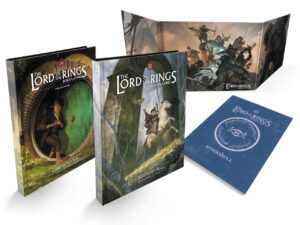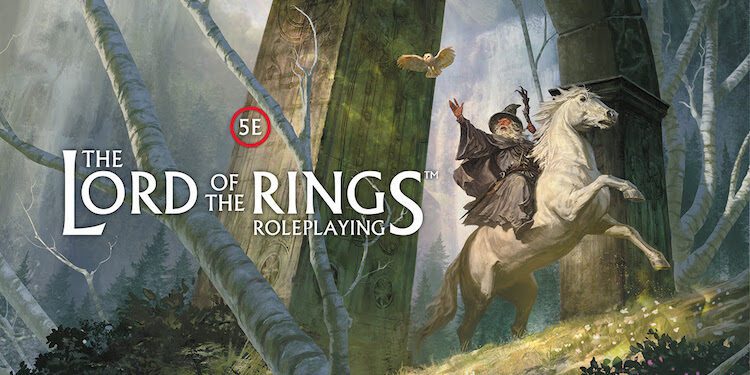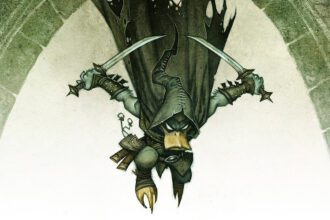Rejoice, the path to Middle-earth has opened for new adventurers. Free League Publishing today officially released the 5E adaptation of the award-winning second edition of The One Ring™ RPG, entitled The Lord of the Rings™ Roleplaying.
The core volume is released alongside the Shire™ Adventures sourcebook and a Loremaster’s Screen with a compendium about Rivendell. All three items are now available for purchase via the official website, and soon in hobby stores worldwide.
Together, you are entering the Lone lands of Eriador. It is here that the One Ring lies, a seed of the past that will one day lead the world to open war against the returning Shadow. The Enemy is moving, and smoke issues once more from Mount Doom, in the land of Mordor…
The new edition of The One Ring™ RPG, set in the world of The Lord of the Rings™ by J.R.R. Tolkien and designed by Francesco Nepitello and Marco Maggi, became the most successful tabletop roleplaying core game ever on Kickstarter in March 2021. Now Middle-earth is open for new roleplayers with the brand new 5E adaptation of The Lord of the Rings™ Roleplaying.
 The Lord of the Rings™ Roleplaying
The Lord of the Rings™ Roleplaying is a 236-page beautifully designed and illustrated hardback volume that contains what players need to create 5E adventures set in the world’s most popular fantasy setting: six original heroic cultures from the land of Eriador, six new classes, a host of terrifying adversaries, and comprehensive rules for journeys, councils, wondrous artifacts, and the subtle magic of Middle-earth.
Shire™ Adventures is a 104-page hardback volume that describes the Shire in great detail, as well as five short adventures and seven pre-generated characters, including famous Bagginses, Tooks, and Brandybucks! The contents of Shire™ Adventures are adapted from the Starter Set for The One Ring™ RPG. A Loremaster’s Screen with a compendium about Rivendell, including a map of the valley and a plan of the house itself, is also available.
On “Too much; too many dark things,” Strider would probably say, but he would be wrong — the structure of the game is very much unchanged from the usual, but for several very distinctive elements, mainly ported over from The One Ring roleplaying game.
Fellowship Points & Patrons
In The Lord of the Rings Roleplaying, all Player-characters belong to a Company. A numerical Fellowship rating represents the bond of mutual trust enjoyed by the members of such a group. It’s a pool of points shared among all players that are mainly spent to gain confidence:
– Players can spend 1 point of Fellowship to gain advantage on an ability check, attack roll, or saving throw.
Every Company of heroes eventually chooses a Patron. Patrons are influential individuals who have taken an interest in the group, and that in the course of the game will provide additional reasons to go adventuring, often offering both support and counsel. Think Gandalf or Elrond, but even Bilbo Baggins or Tom Bombadil!
– All Patrons may raise a Company’s pool of Fellowship points, and/or provide another mechanical advantage, usually connected to the expenditure of Fellowship points.
Magical Success
Oh, the ‘subtle magic’ of Middle-earth! Such a fleeting concept… how to capture it in game terms? In this case, with a simple rule —the possession of enchanted objects, like magic rings or cloaks, and the knowledge of ancient spells or uncanny powers, allows heroes to exceed the possibilities of mere mortals.
– In game terms, having the possibility to trigger a magical success allow a hero to succeed automatically at tasks that would be otherwise nearly impossible to achieve — for example, to disappear while in a crowd, or to cross a river running on a tightrope.
Cultural Backgrounds
Backgrounds, the backstories of all 5e characters, are presented as connected to a hero’s choice of Culture and have been simplified in game terms.
– There are six backgrounds per culture, each providing two skill proficiencies, a tool proficiency, and two distinctive features.
Rewards, Virtues, and Crafts
One of the things that makes a game based on Tolkien differ from other fantasy worlds is the almost complete absence of spellcasting. The heroes of The Lord of the Rings Roleplaying do not have at their disposal cantrips or spells, a feature connected mainly to Sorcery, the bad sort of magic. What ‘magic’ is readily available to them takes the form of either a Reward, a Virtue, or a Craft.
– Rewards are pieces of war gear of superior craftsmanship, granted to a hero as an award for their deeds.
– Virtues are unique abilities and special talents, the majority of which are characteristic of a given culture, making Hobbits very different from Dwarves, or Elves from Men.
– Crafts are special techniques that can be acquired by any adventurer that are granted thanks to a high level in skill and knowledge. They allow players to achieve effects very close to those of spells in other fantasy games, such as the ability to frighten or charm enemies with the power of words and music alone, talk to and befriend animals, or fabricate objects such as magical cloaks, rune-scored swords, and even lesser rings of power…
Council & Journeys
By its very nature, The Lord of the Rings Roleplaying is a game in which monster-slaying and treasure-hunting is not as paramount as in other fantasy games. It is therefore not surprising that the game provides detailed and thematic rules for traveling (Journeys) and social interactions (Councils).
– Journeys allow the exploration of Middle-earth to be experienced as an important phase of the game, where dangers, unexpected situations, and natural wonders inspire the players, making them feel part of a living and majestic world.
– Councils fulfill the task of dealing with situations where players cannot simply cut their way through with violence, and that of creating engaging moments of roleplaying and interaction with some of the most famous personalities in the setting (an aspect also supported by the rules for Patrons).
The Fellowship Phase
The Lord of the Rings Roleplaying provides unique rules for the management of ‘downtime’, periods of inactivity between adventures in which heroes rest and prepare for their next quest.
– The Fellowship Phase allows the heroes to engage in thematic and interesting activities, such as writing songs, studying maps and magical items, partying (!), collecting rumors, and meeting important personalities. All of these activities have consequences and benefits for the players when they return to active adventuring, thus making downtime an exciting part of the game.
Treasure
Finding a magic ring or a famous sword in The Lord of the Rings Roleplaying is not simply a matter of stumbling upon an exotic object. There is more to chance than coincidence in Middle-earth, as there are other powers at work far stronger — something replicated in the game with Magical Treasure rolls and the Treasure Index.
– If you want to add spell-bound gems and Elven blades to a game you must first take some time to create a Treasure Index, a list detailing all the magical items that you want your players to eventually find. Then, players uncover something valuable during the game by succeeding at a Magical Treasure roll, whose result is then referenced on the Treasure Index to check exactly what has been brought to light. Using a Treasure Index allows you to keep tight control over the desired level of magic to introduce into the game, avoiding the problem of having too many heroes wandering around Middle-earth wielding Beleriand-forged blades or wearing Mithril armor. Additionally, the index lets you ‘time’ the appearance of certain magical items in the campaign — for example, to follow a wide-arcing plot involving discovering a particular object.
Shadow Points
One of the most important themes (if not THE most important) of The Lord of the Rings is undoubtedly the influence of the Shadow, understood as the corruption of the soul generated by fear, greed, and lust for power. The heroes of The Lord of the Rings Roleplaying are not perfect, unflawed heroes, impervious to the most terrible torments and the most irresistible temptations: on the contrary, they are human, fallible, gripped by doubt, and ultimately fragile in the face of a seemingly all-consuming evil.
– In game terms, characters of The Lord of the Rings Roleplaying gain Shadow points from various sources (Dread, Sorcery, Greed, and Misdeeds), each resisted with a different saving throw (Charisma for Dread, Intelligence for Sorcery, and Wisdom for Greed). Although not immediately dangerous, in the long run, these Shadow points have an impact on the characters’ psyche, driving them to sadness, despair, or even madness, ultimately forcing them to retire from adventuring (or, in the case of Elves, to leave Middle-earth and sail West).

 The Lord of the Rings™ Roleplaying is a 236-page beautifully designed and illustrated hardback volume that contains what players need to create 5E adventures set in the world’s most popular fantasy setting: six original heroic cultures from the land of Eriador, six new classes, a host of terrifying adversaries, and comprehensive rules for journeys, councils, wondrous artifacts, and the subtle magic of Middle-earth.
The Lord of the Rings™ Roleplaying is a 236-page beautifully designed and illustrated hardback volume that contains what players need to create 5E adventures set in the world’s most popular fantasy setting: six original heroic cultures from the land of Eriador, six new classes, a host of terrifying adversaries, and comprehensive rules for journeys, councils, wondrous artifacts, and the subtle magic of Middle-earth.


